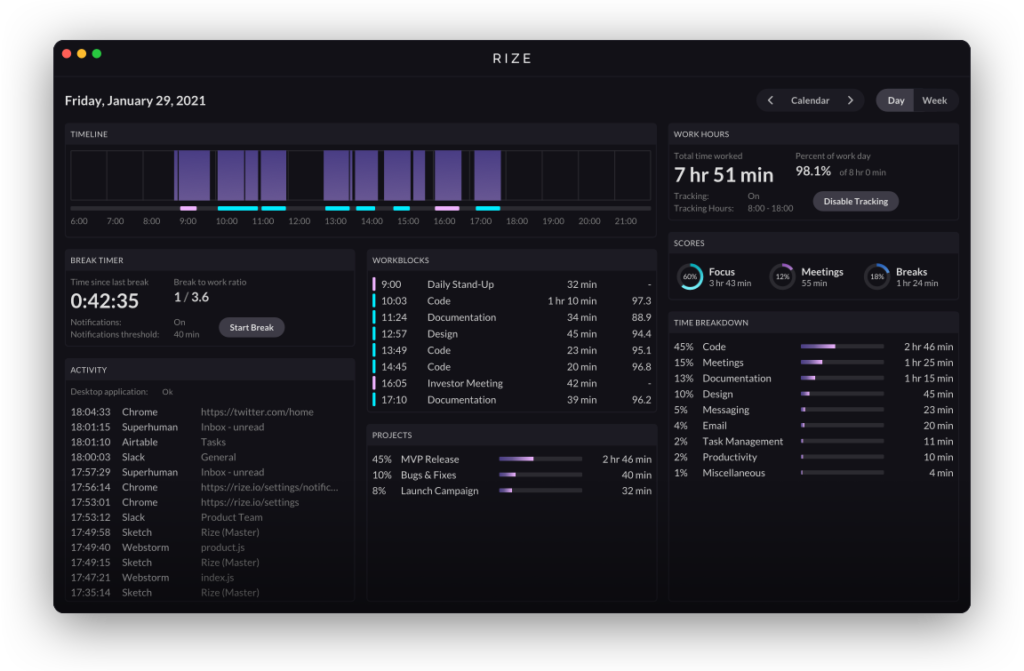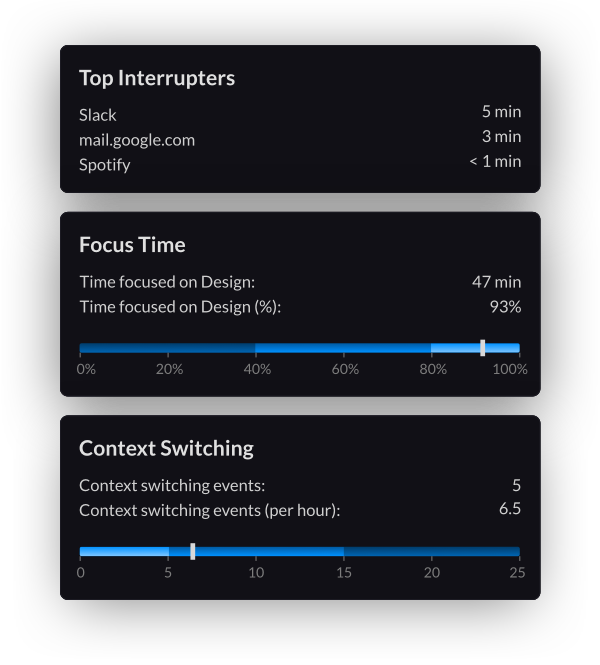As the saying goes, time is our most precious currency: once we spend it, it’s gone. Yet, somehow, we rarely make a conscious effort to better understand and manage how we spend our time. Sure, at a macro level, we may use a calendar, and try to make sure to carve time out to enjoy with our loved ones, to acquire new skills, and to explore the world. But what about the micro-level, the way we spend our precious minutes and seconds?
Will Goto and Macgill Davis made it their mission to help us reclaim our focus, build better work habits, and mindfully improve our productivity. Together, they are building Rize, an intelligent time tracker to increase our ability to perform deep work. To one of our questions, Will replied: “How we spend our time is how we spend our lives.” By giving people more control over the way they spend their time, their hope is for Rize to help people around the world improve the way they spend their lives.
If you have ever struggled with distraction, context-switching, and inconsistent habits, read one — you may learn a thing or two. In this interview, we talked about the power of tracking your time, how to quantify our focus, how to reinforce positive habits, the value of deep work, how to take breaks without losing momentum, and much more. Enjoy the read!
Hi Will, thank you so much for agreeing to this interview. Rize is probably one of the most in-depth time trackers out there. What inspired you to build it in the first place?
Thank you for the opportunity! My cofounder, Macgill, and I were previously cofounders of a venture-backed startup that we shut down at the beginning of 2020, and as previous software engineers at Twitter and various early-stage startups, we wanted to build something that could help other software engineers further their career. Before building anything, we spent several weeks interviewing engineers about their problems and what was important to them at work.
It turned out that figuring out where their time goes was the top value proposition for our initial test group. Many people expressed how at the end of the day they weren’t able to get any work done and didn’t understand where their time was going. Getting a clear picture or “replay” of their day was something that could help them understand what could have been cut out. Our investigation into the existing time trackers showed that no one had quite nailed the experience of taking tracked time and giving you exactly what you wanted to know. We later learned that people track time for many different reasons, and allowing them to customize how certain apps or websites get categorized was key to our early success.
In general, Macgill and I are incredibly passionate about how we work in addition to our work. We have an inherent drive to deepen our understanding of ourselves as well as continually improve, so naturally, building a time tracking app made a lot of sense to us.
Talking about how we work… Instead of just tracking how much time is spent working, Rize allows you to dig into the quality of your focus time.
Being intentional about your focus time is something that is incredibly important for knowledge workers and creatives today. Cal Newport mentions in his book, Deep Work, how the ability to perform deep work is becoming increasingly rare at exactly the same time it is becoming increasingly valuable in our economy, and I think this is very true. Your productivity is directly tied to how much focus time you get as well as the quality of that focus time.
In Rize, we quantify focus time through an algorithm, and for each focus session, we show you a breakdown of metrics. This includes how much of that time was spent focused versus spent on distracting categories like social media or email, how often you would context switch, and which apps or websites were disrupting your flow. At the moment, we only give the data you need to understand what behavioral changes you need to make, but we have a few features in the works that will actually help you with the behavioral change as well.
That’s exciting — it can be hard to build work habits in such a distracting world.
I think the best way for me to stick with a habit is to quantify it and review it on a daily basis. They say, “you can’t improve what you don’t measure,” but I also think that measuring is a great way to help you reinforce a positive habit. For example, if I wanted to reclaim my focus time, I would look at how much I’m getting on a daily basis and if it is improving over time. On days where I get substantially less focus time, I’ll dive deeper to understand what made it worse (it’s usually meetings) and iterate from there.
Taking breaks seems to be an important part of what Rize can help with. Is this design choice based on personal experience?
There are dozens of studies on how taking breaks actually makes you more productive in the end, but it’s incredibly difficult to internalize when you’re in the middle of a working session to just step away out of fear of losing momentum and concentration. Personally, I didn’t really understand the power of breaks until I began working in a Pomodoro-like fashion. In the end, I found it difficult to stick to the Pomodoro technique because it required me to cognitively prioritize the technique over my own work, and I would always forget to start the timer.
Once I realized I could have Rize notify me that I’ve been focused after a certain amount of time, I was able to have the best of both worlds: Pomodoro-like work sessions with notifications to take breaks without having to set manual timers. It’s one of the best features of Rize in my opinion.
You seem to be a big fan of the quantified self. Can you tell us more about this movement and how time tracking can help with personal development?
While it’s pretty obvious, it has to be said that how we spend our time is how we spend our lives. It’s the one resource in our lives that we can’t get back at all if we waste it. I think any personal goal whether it’s to be more productive, spend more time with family, or improve your physical fitness, time has a direct impact on the outcome and should be considered or managed as part of the process. It is the most valuable resource in improving anything.
What kind of people use Rize? Any surprising use cases?
We found that executives, entrepreneurs, freelancers, product managers, and tech leads are the most common people who find Rize to be invaluable in terms of tracking work, but almost anyone can use it and benefit from it. We found some users track interesting non-work-related hobbies on Rize. One user was using our projects feature to track how much time he was spending reading certain books, and I use it to track the time I spend practicing classical guitar as well as how much time goes into learning new songs versus maintaining my repertoire.
What would success look like for Rize? Any interesting plans in the work?
In many ways, Rize is already a success for us. Being able to build the MVP in 3 months and to have the product we have now 6 months later is a testament to how efficient the app has allowed us to be. Currently, I average 6-hour workdays and I couldn’t be happier with the quality and speed of my output as well as the state of my mental well-being. My cofounder is on a very similar level, and many of our users have reported similar achievements.
As for the business, we recently hit a huge milestone and became profitable last month without any outside funding. Our goal with Rize is to build a self-sustaining business and work on it for the long term.
Thank you so much for your time! Where can people learn more about Rize?
The easiest way to learn more about Rize is to visit our website or to watch the video below. You can also email me or my cofounder at will[@]rize.io or macgill[@]rize.io respectively if you have any questions. Thanks again for giving us the opportunity to be interviewed for Ness Labs!


